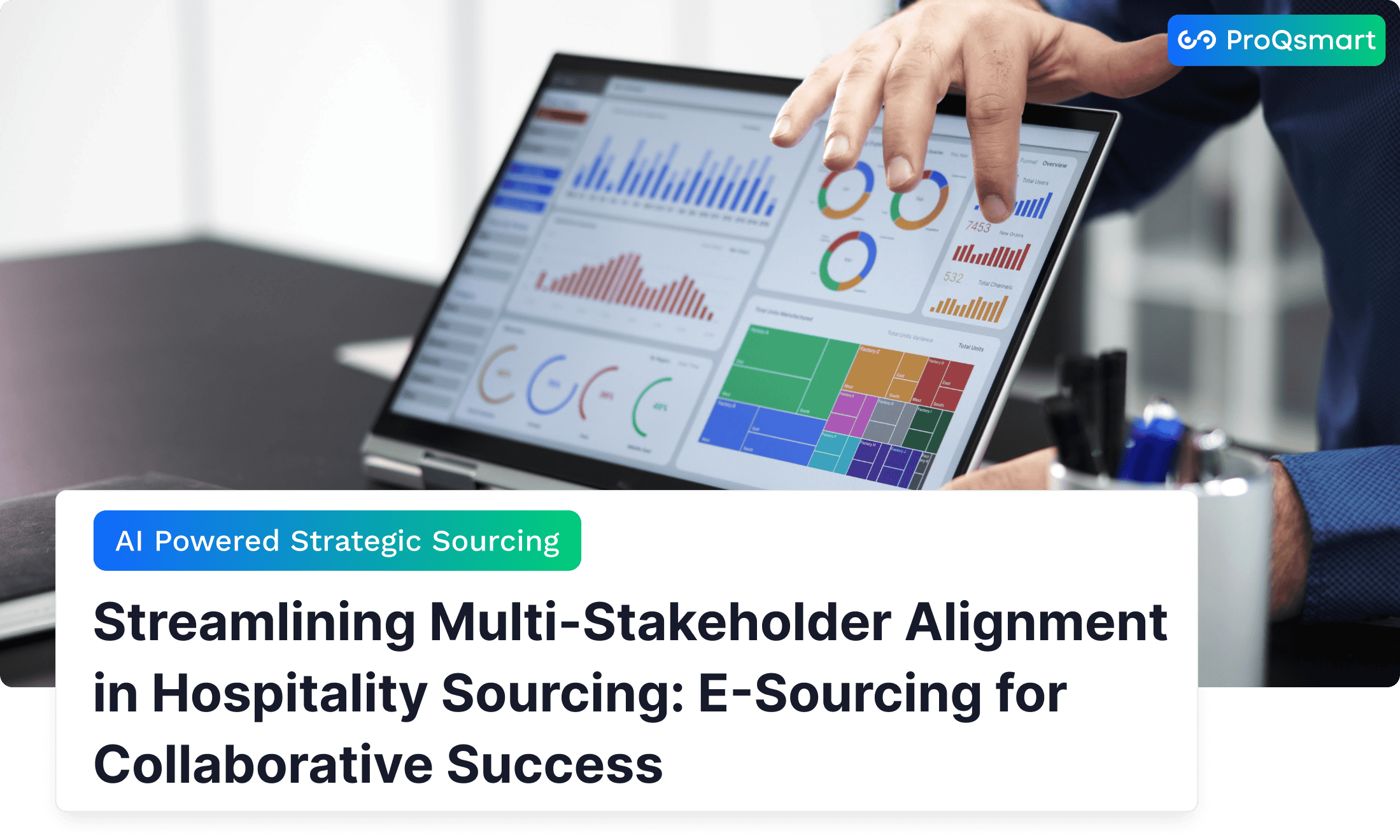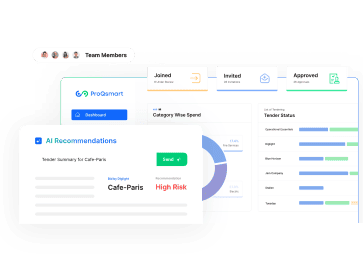Streamlining multi-stakeholder alignment in hospitality sourcing is critical to uniting internal teams, suppliers, and third-party partners into a cohesive, efficient unit that minimizes costs while maximizing quality. Effective alignment eliminates confusion, prevents delays, and curtails unnecessary expenses by ensuring all parties share a unified vision and clear objectives. Modern hospitality organizations leverage advanced e-sourcing platforms and standardized processes to maintain this alignment. This fosters seamless communication and data-driven decision-making. Sustainable, high-quality outcomes emerge when sourcing teams and management prioritize proactive vendor engagement and regular progress updates throughout the procurement cycle. For hospitality professionals, mastering multi-stakeholder alignment is essential to overcoming inefficiencies and achieving collaborative success.
The following section explores practical strategies to optimize alignment and accelerate consensus, driving measurable results.
Why Stakeholder Alignment Matters in Hospitality Sourcing?
Sourcing stakeholder alignment is the strategic practice of unifying all parties involved in the hospitality procurement process—suppliers, procurement teams, finance, operations, and leadership—around a shared definition of success for each sourcing project. By proactively addressing stakeholder needs through methods such as interviews, surveys, focus groups, or direct conversations, teams can reduce confusion, build trust, and foster collaboration. Moreover relationship mapping further enhances this process by identifying key influencers, their interests, and interrelationships, enabling the rapid detection of role overlaps or gaps. Far from a one-time task, alignment demands ongoing commitment, supported by consistent reporting and feedback mechanisms to maintain focus on shared objectives. This disciplined approach minimizes ambiguity, accelerates decision-making, and prevents costly delays driven by misaligned assumptions. Strategic sourcing tools, such as spend analytics, empower teams to uncover savings opportunities, optimize long-term planning, and ensure business continuity, even in volatile markets, thereby driving effective procurement and profitability.
Key Players in Hospitality Sourcing
Procurement ensures strategic supplier selection, while hospitality procurement professionals focus on daily operational needs and finance provides budgetary oversight. Suppliers deliver essential goods and services, and leadership aligns sourcing with broader organizational goals. Accordingly cultivating strong, collaborative relationships among these groups accelerates decision-making, enhances operational efficiency, and delivers superior outcomes for both guests and the hospitality business. By fostering open communication and mutual trust, these stakeholders can streamline procurement processes, reduce inefficiencies, and drive sustainable value across the hospitality supply chain.
What Are the Key Obstacles to Alignment in Hospitality Sourcing?
Achieving internal stakeholder alignment in hospitality procurement is essential but often challenging due to the complex interplay of diverse groups and priorities. Below are the key obstacles that can hinder effective procurement practices in the hospitality sourcing process.
- Conflicting Priorities: Procurement, operations, finance, and leadership often have misaligned goals, like cost vs. quality, slowing decisions.
- Poor Communication: Inconsistent or unclear communication leads to misunderstandings and errors in sourcing requirements.
- Siloed Teams: Isolated departments cause role overlaps or gaps, reducing collaboration and efficiency.
- Limited Data Access: Lack of spend analytics or supplier data hinders informed decision-making and transparency.
- Resistance to Change: Stakeholders may resist new tools or processes, delaying adoption of efficient sourcing solutions.
- Time Constraints: Tight schedules limit stakeholder engagement, risking incomplete alignment.
- Market Volatility: Supply chain disruptions or price fluctuations shift priorities, complicating consensus.

How Can Hospitality Sourcing Achieve True Stakeholder Alignment?
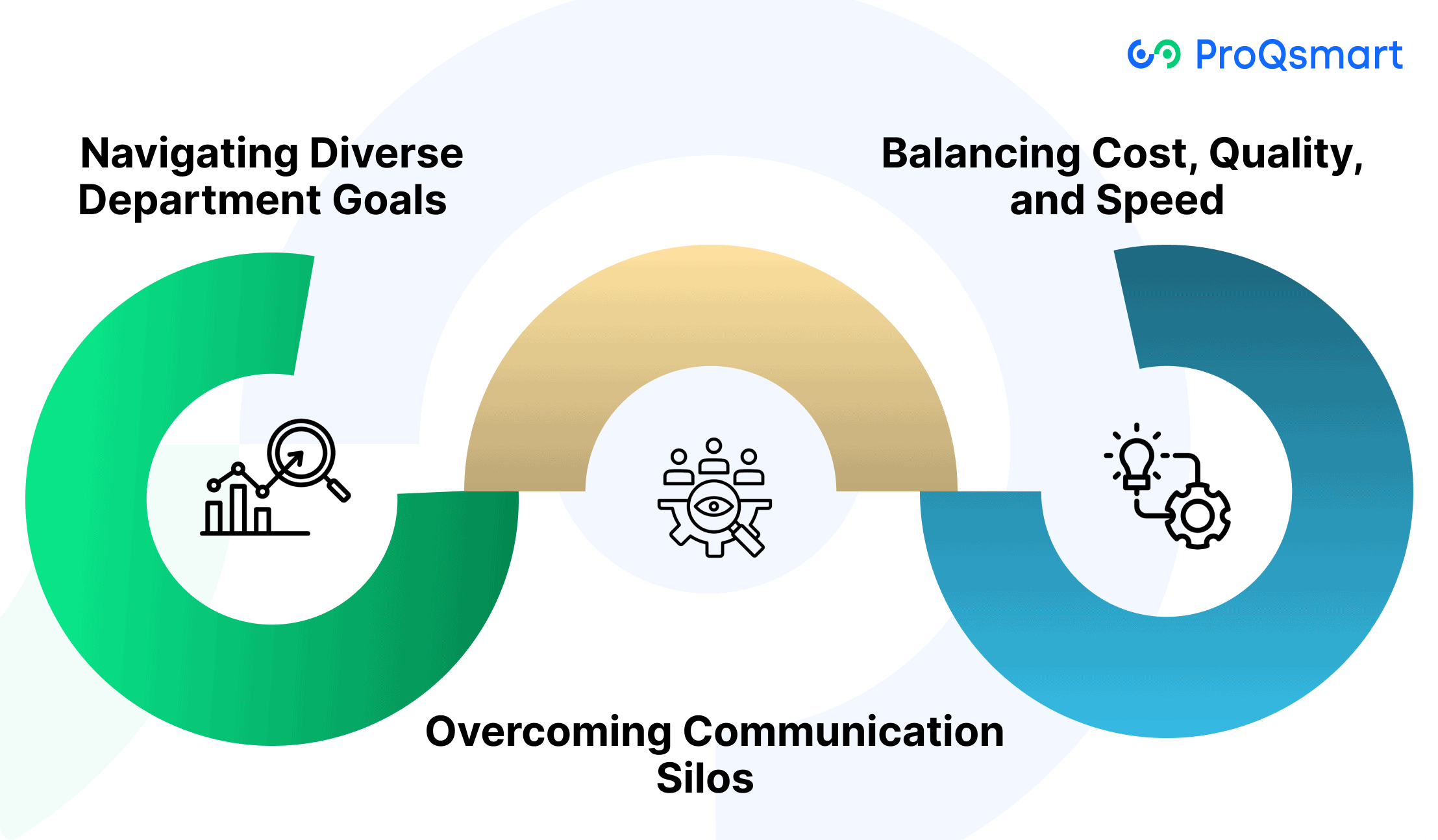
Hospitality sourcing might seem like a tangled maze of moving parts. Since every department—food and beverage, housekeeping, guest services, etc.—has its individual objectives, these can conflict. The hospitality industry runs on a continuum of more traditional products and services like produce while relying on cutting edge solutions like energy saving linens.
Quality, cost, speed – all of that needs to align while considering sustainability and social impact. Misalignment usually results from differences in priorities, lack of role clarity, or communication breakdown. These complications can cause sourcing to lag, raise expenses, and endanger guest experience.
In order for sourcing to be effective, hospitality companies will require robust collaboration and standardized metrics to gauge success.
Navigating Diverse Department Goals
-
Conduct collaborative planning workshops early in major sourcing initiatives.
-
Build cross-functional teams with clear roles.
-
Agree on shared goals and timelines.
-
Use one set of metrics for all teams.
-
Conduct consistent touchpoints to ensure continued alignment.
Consistent check-ins ensure everyone on teams understands the full scope. Shared metrics align everyone’s attention beyond their own individual tasks but the entire business.
Overcoming Communication Silos
-
Use cloud-based tools for updates and document sharing.
-
Start open forums for honest feedback.
-
Create regular communication intervals weekly or monthly that include every department.
Honest conversation goes a long way to breaking down barriers. The more straightforward and more frequent the updates, the less shocking they will be.
Balancing Cost, Quality, and Speed
In hospitality sourcing, cost, quality, and speed often present competing priorities, requiring teams to establish a clear, tailored framework to navigate these trade-offs effectively.
Equipped with robust data analytics, teams can make informed decisions, leveraging real-time insights to identify the optimal balance for each sourcing project. By grounding decisions in data—such as cost-benefit analyses, supplier performance metrics, or delivery timelines—procurement professionals can strategically align their choices with organizational objectives, ensuring efficiency, quality, and financial prudence without compromising operational agility.
How Can Hospitality Teams Achieve Collaborative Sourcing Success?
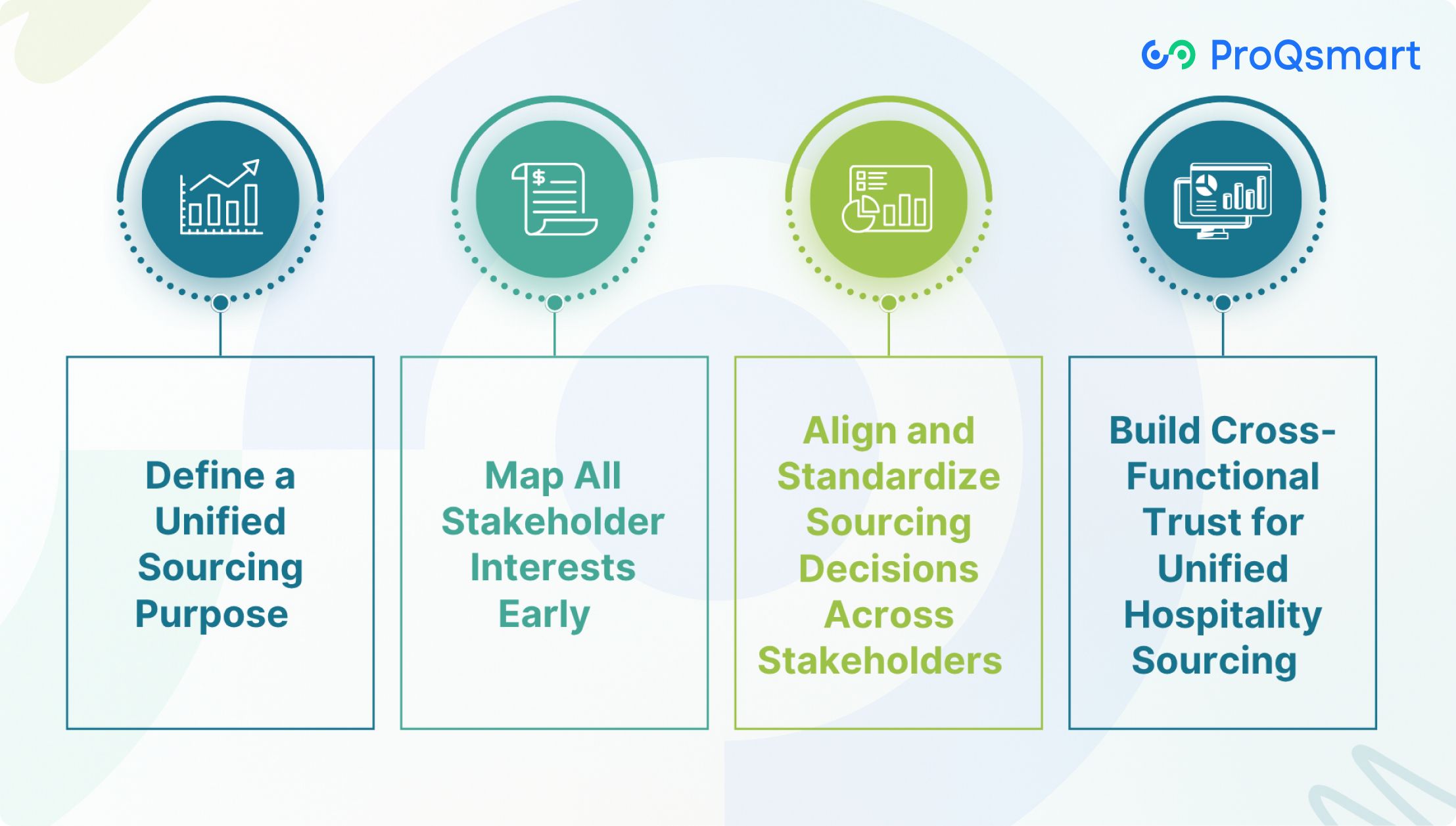
Successful hospitality sourcing hinges on precise alignment among all stakeholders—owners, operators, suppliers, and procurement teams—united by a shared purpose, clearly defined responsibilities, and access to real-time, actionable data. Achieving this level of coordination is a complex endeavor that demands more than routine meetings or shared spreadsheets. It requires transformative change, robust partnerships, and transparent digital platforms that foster open communication and public-facing engagement. These elements create a dynamic environment conducive to innovation, enabling teams to adapt swiftly to market fluctuations and capitalize on emerging opportunities. By leveraging advanced e-sourcing tools and cultivating strong, collaborative relationships, hospitality organizations can drive efficiency, reduce hidden costs, and consistently outperform competitors in a rapidly evolving industry.
Define a Unified Sourcing Purpose
The first step for any successful sourcing initiative is to define a unified purpose. Teams perform most effectively when each member understands their collaborative purpose for sourcing and what will constitute success. This common objective connects finance, operations, and design, ensuring that the objectives of each group align with the overall purpose.
Map All Stakeholder Interests Early
To achieve effective stakeholder alignment in hospitality sourcing, teams must engage in impartial, inclusive discussions to comprehensively understand the priorities of all involved parties—procurement, operations , finance, suppliers, and executive leadership. By systematically documenting each group’s interests—price, timeliness, brand quality, and environmentally sustainable options—teams can identify synergies and conflicts, fostering collaborative decision-making. Early stakeholder mapping is a strategic tool that highlights potential risks and misalignments, enabling proactive resolution of issues before they disrupt sourcing processes. .
Align and Standardize Sourcing Decisions Across Stakeholders
Define clear criteria for supplier selection, spend monitoring, and performance evaluation to align stakeholders in hospitality sourcing. Standardized templates and checklists ensure consistency and focus on cost-effective, collaborative outcomes. Comprehensive training equips all team members to uphold these standards, minimizing risks from inconsistent decision-making.
Build Cross-Functional Trust for Unified Hospitality Sourcing
Promote regular cross-departmental check-ins and celebrate collective milestones to reinforce a culture of mutual respect among all sourcing stakeholders—procurement, operations, finance, and beyond. Trust and alignment grow when information is accessible, feedback is openly shared, and decisions are made transparently. By fostering this collaborative spirit, hospitality organizations empower teams to respond swiftly to sourcing challenges, maintain clear communication, and drive unified outcomes—even in the face of industry disruptions. This environment ensures everyone stays focused on shared goals, strengthening both resilience and results across the sourcing process.
E-Sourcing: Unifying Stakeholders for Collaborative Hospitality Sourcing
E-sourcing has emerged as an invaluable resource for collaborative hospitality teams eager to get all of these diverse stakeholders on the same page. More importantly, it allows teams to function as a cohesive unit, regardless of geographic separation. Making sourcing more digital keeps hotels, resorts, and hospitality groups in the loop. This method helps teams to collectively drive better decisions. E-sourcing fosters transparency and accountability.
When teams use tools like ProQsmart , they get real-time data, easy ways to work together, and a clear view of supplier relationships—all in one place. This helps collaborate more seamlessly and helps ensure that projects stay on schedule.
Achieve Real-Time Data Transparency for Aligned Hospitality Sourcing
E-sourcing platforms like ProQsmart empower hospitality organizations to break down information barriers and drive true multi-stakeholder alignment. With real-time dashboards and live data updates, every team involved in sourcing—procurement, finance, operations, and management—accesses the same up-to-date figures simultaneously. This unified visibility ensures that all stakeholders are making decisions based on consistent, accurate information, eliminating confusion and miscommunication.
Advanced analytics within e-sourcing solutions enable teams to collaboratively evaluate supplier bids, proactively identify risks, and monitor spend across properties in real time. Digital scorecards and feedback tools make it easy to track supplier performance, fostering accountability and shared understanding. This level of transparency not only builds mutual trust among cross-functional teams but also accelerates consensus, leading to smarter, faster, and more cohesive sourcing decisions that drive success in the dynamic hospitality sector
Digitize and Simplify Workflows for Seamless Stakeholder Collaboration
E-sourcing helps to empower hospitality organizations to break down information barriers and drive true multi-stakeholder alignment. With real-time dashboards and live data updates, every team involved in sourcing—procurement, finance, operations, and management—accesses the same up-to-date figures simultaneously. This unified visibility ensures that all stakeholders are making decisions based on consistent, accurate information, eliminating confusion and miscommunication.
Advanced analytics within e-sourcing solutions enable teams to collaboratively evaluate supplier bids, proactively identify risks, and monitor spend across properties in real time. Digital scorecards and feedback tools make it easy to track supplier performance, fostering accountability and shared understanding. This level of transparency not only builds mutual trust among cross-functional teams but also accelerates consensus, leading to smarter, faster, and more cohesive sourcing decisions that drive success in the dynamic hospitality sector
Enable Unified, Data-Driven Decisions in Hospitality Sourcing
E-sourcing platforms such as ProQsmart are designed to foster a unified decision-making process among diverse hospitality stakeholders. By centralizing notes, comments, ratings, and rankings, these tools ensure that every voice—whether from procurement, operations, or finance—is heard and valued throughout the supplier selection journey. Stakeholders can actively participate in discussions, provide real-time feedback, and collaboratively vote on supplier options, all within a single digital environment.
With access to robust, data-driven reports and analytics, teams are empowered to evaluate suppliers and award contracts based on transparent, objective criteria rather than subjective preferences. This collaborative, fact-based approach not only strengthens alignment but also leads to more confident, cohesive decisions that drive successful outcomes in hospitality sourcing
Enhancing Supplier Communication for Better Hospitality Sourcing Outcomes
Digital sourcing platforms transform supplier relationships by making negotiations more transparent, efficient, and collaborative. Features like integrated chat, feedback forms, and shared workspaces enable procurement teams to maintain open, real-time communication with suppliers at every stage of the sourcing process. This consistent interaction ensures that expectations are clear, questions are addressed promptly, and any issues can be resolved collaboratively.
Documented communication and transparent records foster trust and accountability, reducing misunderstandings and streamlining negotiations. As a result, both parties can focus on creating mutually beneficial agreements, leading to stronger partnerships, better contract terms, and smoother project execution. In the hospitality sector, this collaborative approach not only secures better deals but also minimizes friction—helping teams and suppliers work together seamlessly for long-term success.

How Can Hospitality Teams Track Multi-Stakeholder Alignment Success?
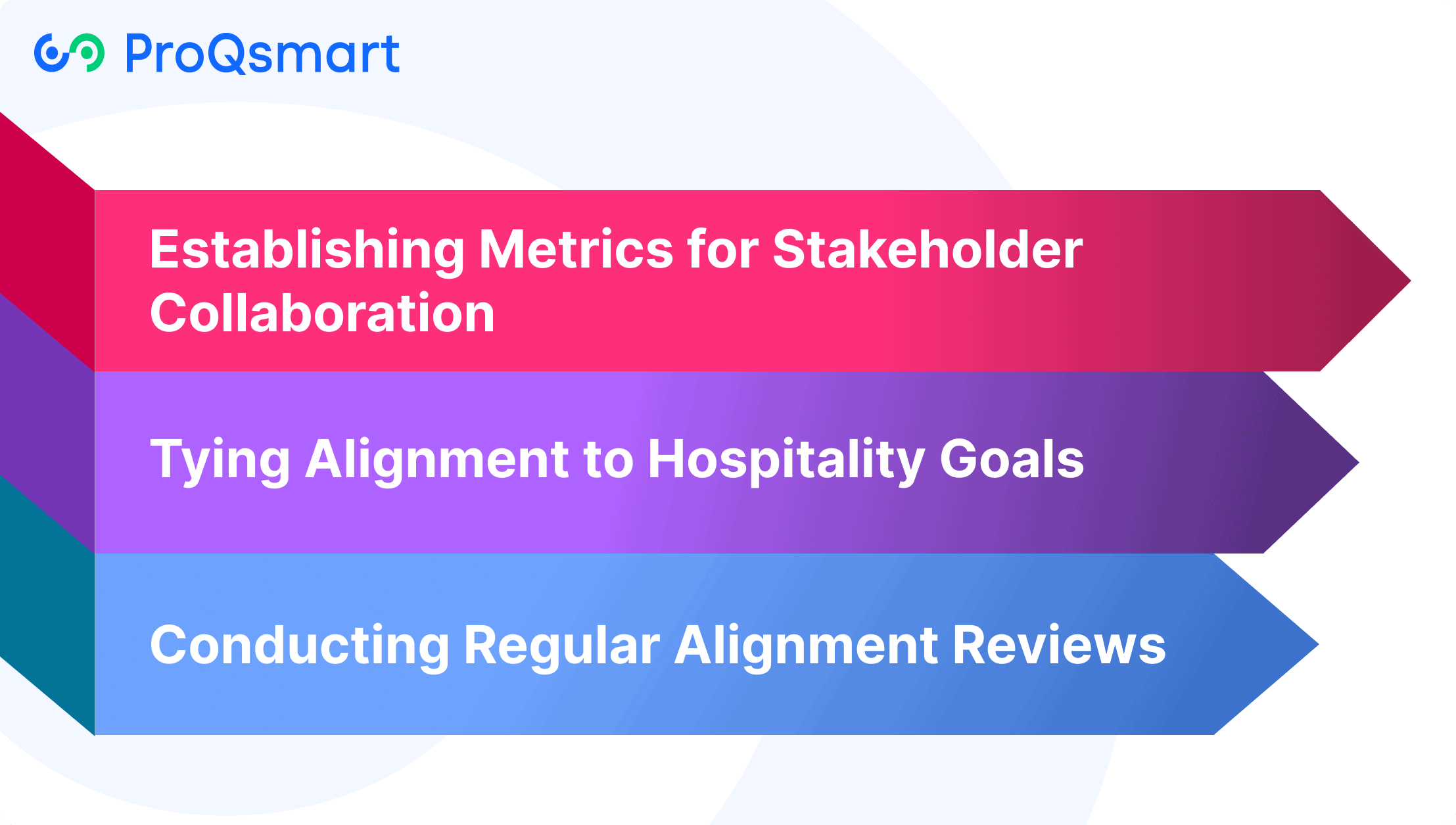
In hospitality sourcing, aligning stakeholders—procurement, operations, finance, and suppliers—drives efficiency, reduces costs, and enhances guest experiences. However, without clear metrics, it’s challenging to gauge whether alignment efforts deliver results. Misalignment can lead to delays or budget overruns, potentially increasing project costs by 10-15%. E-sourcing platforms streamline this process by providing tools to measure collaboration effectiveness. This section outlines how hospitality procurement teams can track alignment success through targeted metrics and consistent reviews, ensuring sourcing projects stay on track and deliver value.
Establishing Metrics for Stakeholder Collaboration
Effective alignment hinges on measurable outcomes. Key metrics include:
-
Bid Alignment Rate: Tracks how often stakeholders agree on supplier bids, reflecting shared priorities in RFPs for FF&E or food supplies.
-
Sourcing Cycle Time: Measures the speed from RFP issuance to supplier selection, indicating streamlined decision-making.
-
Stakeholder Satisfaction Scores: Captures feedback from procurement, operations, and finance on collaboration quality, gathered via surveys.
These metrics, accessible through e-sourcing dashboards, provide real-time insights, enabling teams to identify gaps and reinforce alignment across hotel or restaurant sourcing projects.
Tying Alignment to Hospitality Goals
Alignment must support core hospitality objectives, such as cost savings, quality assurance, and guest satisfaction. For instance, aligned sourcing for a restaurant opening ensures timely delivery of high-quality ingredients within budget, boosting guest experiences. By linking metrics like sourcing cycle time to outcomes (e.g., 12% faster project delivery), teams can quantify alignment’s impact. E-sourcing tools enhance this by offering analytics to correlate collaboration with reduced costs or improved supplier performance.
Conducting Regular Alignment Reviews
Frequent evaluations sustain alignment in hospitality’s fast-paced environment. Weekly check-ins via e-sourcing platforms allow teams to address misalignments, such as conflicting supplier preferences, while quarterly reviews assess long-term sourcing outcomes. For example, a hotel chain can analyze bid alignment rates to refine future RFPs. ProQsmart’s analytics streamline these reviews, providing data-driven insights to adapt processes, foster trust, and drive continuous improvement in collaborative sourcing.
Conclusion
Achieving effective multi-stakeholder alignment is essential for success in hospitality sourcing, where diverse teams and complex requirements must come together seamlessly. While aligning multiple stakeholders can be challenging, it ultimately drives greater efficiency, faster decision-making, and more competitive pricing. Leveraging e-sourcing platforms enables real-time collaboration, clear role definition, and transparent tracking—key factors that minimize miscommunication and foster accountability.
When all parties are aligned and working toward shared goals, sourcing processes become more streamlined, risks are reduced, and procurement outcomes improve significantly. Collaborative sourcing not only enhances operational agility but also builds stronger supplier relationships based on trust and transparency.
To unlock these benefits and transform your hospitality sourcing strategy, consider adopting advanced e-sourcing solutions like ProQsmart. Schedule a demo today to explore how technology can empower your team to achieve collaborative success.


